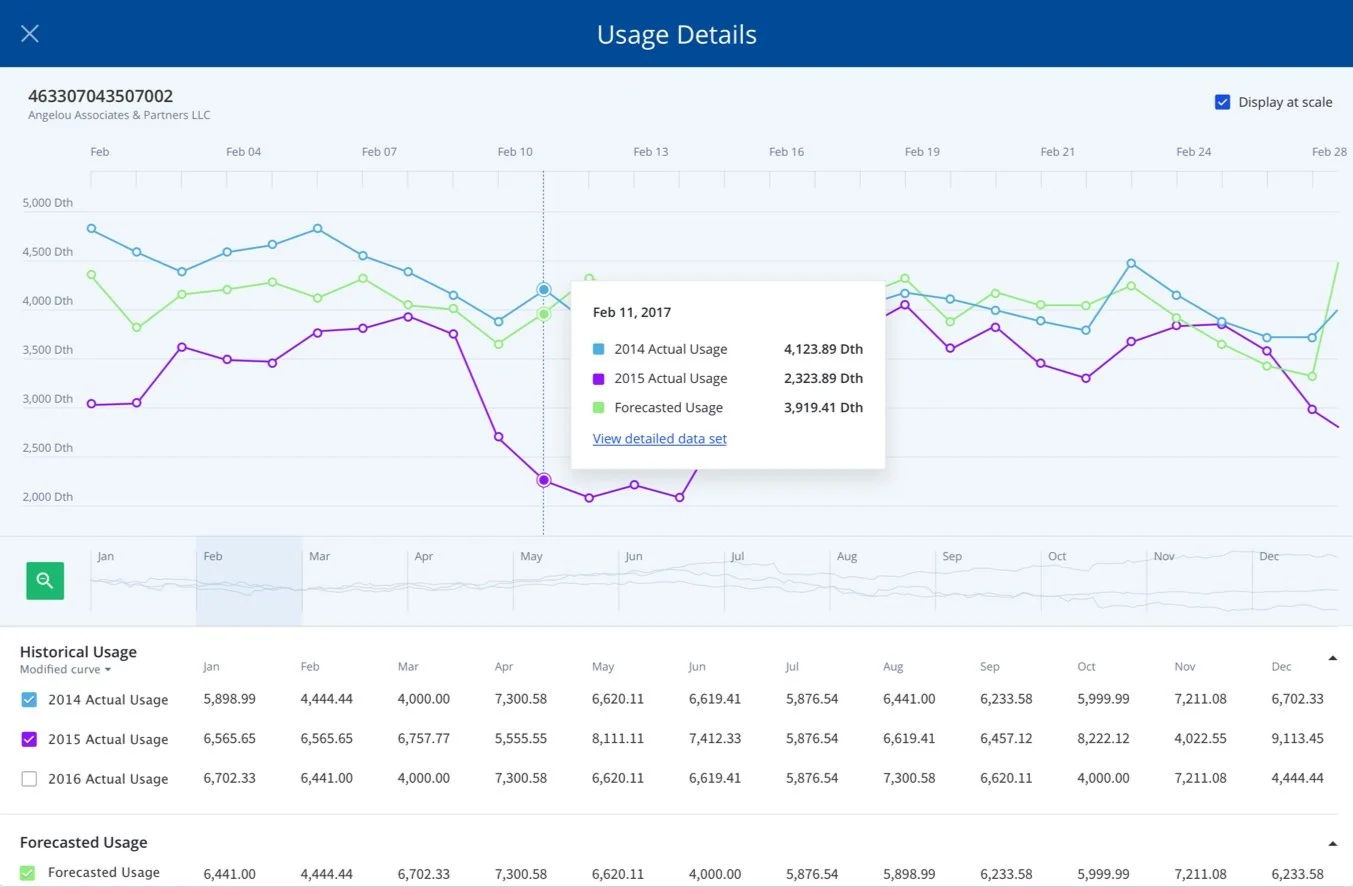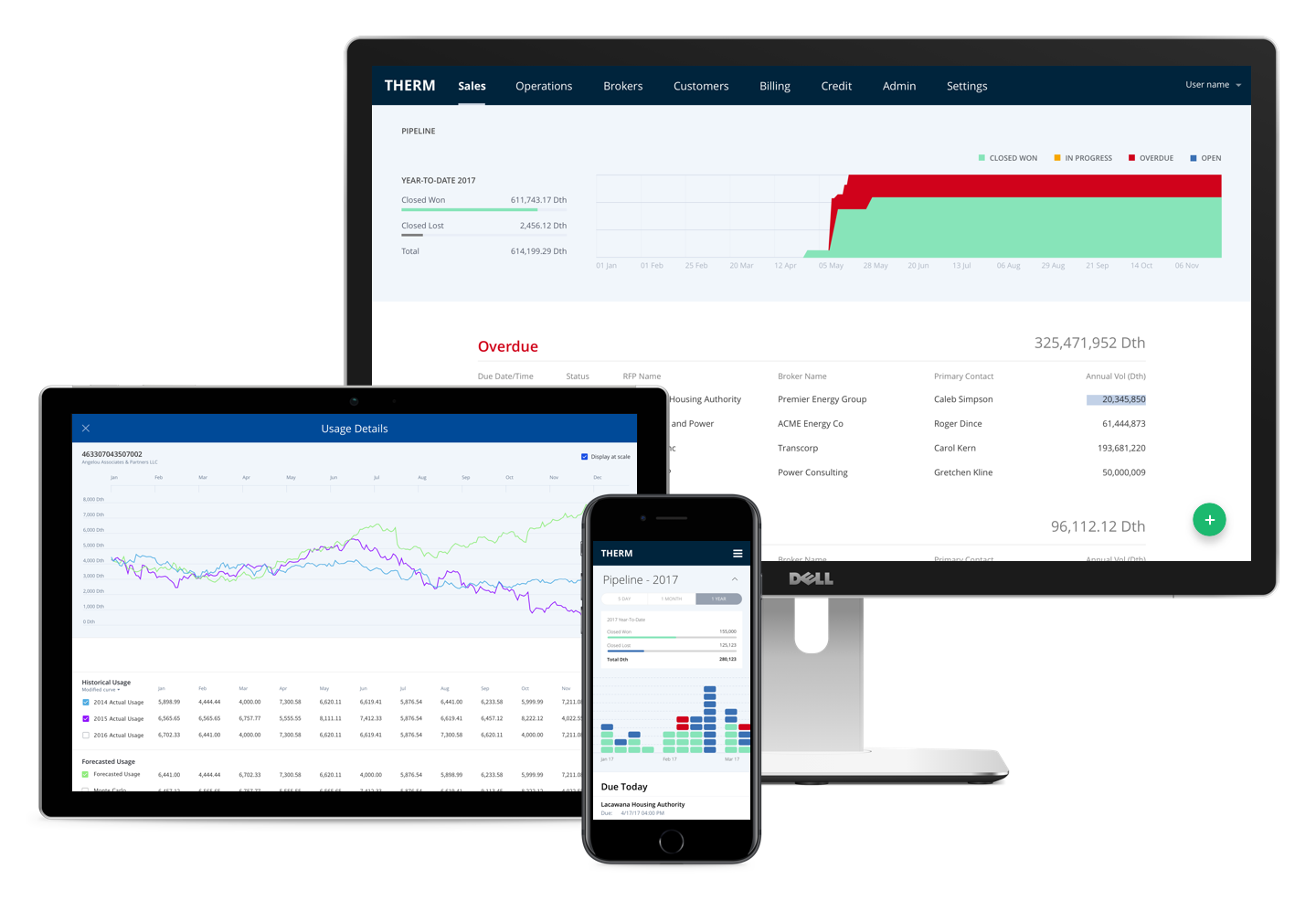Transformed Manual Energy Pricing Into a Real-Time Bidding Engine
Role: Principal Product Designer
Years: 2016–2017
Team: CEO, Engineering Lead, Graphic & Motion Designers
About Therm
Therm is a retail energy automation platform operating in the $43B natural gas market. It automates pricing, bidding, CRM, and forecasting, replacing spreadsheets and email with real-time, rules-based tools for brokers, suppliers, ISVs, and analysts.
Summary
Pre-seed and founder-led, Therm was an ambitious bet: to turn a vision for automated energy procurement into a working, investor-ready platform. I partnered directly with the CEO to help translate that vision into software, user flows, and early traction.
We replaced an Excel-based energy pricing process with a scalable automation system. As lead designer, I re-architected the system to streamline operations, reduce costs, and unlock growth, without adding headcount.
AT A GLANCE:
improvement in pricing efficiency
20x
improvement in sales efficiency
10x
reduction in IT costs
40%
increase in net profits
16%
Sizzle reel for Therm, a fully integrated retail energy automation platform.
The Challenge
Energy retail companies relied on outdated, manual processes that were prone to errors and inefficiencies, leading to high IT and operational costs. Energy suppliers faced two big problems:
Manual bid review processes that couldn’t scale.
Pricing accuracy that eroded margin.
Even minor errors rippled across contracts worth millions. A late bid or mispriced quote introduced real financial risk. Therm needed a platform that could automate with confidence and support scale.
In the United States, the demand for natural gas is on a modest upward trajectory, growing at a 0.4% annual rate up to 2025, primarily fueled by increased industrial usage. (source)
My Role
To keep momentum, I had to impose structure without slowing the founder down, moving between high-level strategy and tactical execution. That meant clarifying scope, sequencing priorities, and working through ambiguity while still designing for evolving requirements.
Facilitated working sessions with execs, brokers, and pricing analysts.
Developed flows across five user groups with conflicting goals.
Designed tools for pricing curves, contract terms, forecasting, and bid generation.
Created a unified design system and extended it into brand and conference collateral.
Directed brand development by hiring and managing freelance designers, delivered logo, visual system, and full brand guidelines to support product and marketing scale.
Approach
Pricing logic vs. usability
Finance wanted complexity. Ops needed simplicity. I mapped pricing rules by role and designed a layered override system with real-time visibility and safe defaults.
Fast vs. fair
Sales prioritized speed. Brokers demanded transparency. I introduced a bid grouping interface to match proposals to similar customers.
Forecast confidence at a glance
To support pricing decisions, I designed a forecasting dashboard that helped analysts compare historical usage with forecasted demand in one place.
"The new platform allows us to process deals and bids at an unprecedented scale, transforming how we manage energy procurement and pricing."
— Brian, Managing Director
The Results
Thanks to its redesigned platform, Therm is now a leader in energy automation, securing major accounts and delivering quantifiable value to customers. Our automated solutions for Therm helped energy retail companies reduce overhead by 40% and increase profitability by 16%. More specifically, RFP responses for brokers skyrocketed from 8 to 80 per week, a 10X increase in sales efficiency, and analysts were able to process 100 deals per day instead of the former 5 per day, a 20X increase in pricing efficiency.
The responsive platform adapts to different roles, offering full functionality on desktops while providing a streamlined experience on smaller devices.
Why It Worked
Built around user-specific workflows, not generic patterns
Balanced automation with legacy systems and handoffs
Extended system thinking from product to brand
Additional Work
-

Simplifying Login and Creating Transactions
-

Increasing Engagement by Simplifying the User Journey
-

Expanding Roles for Smarter Workflows and Permissions




